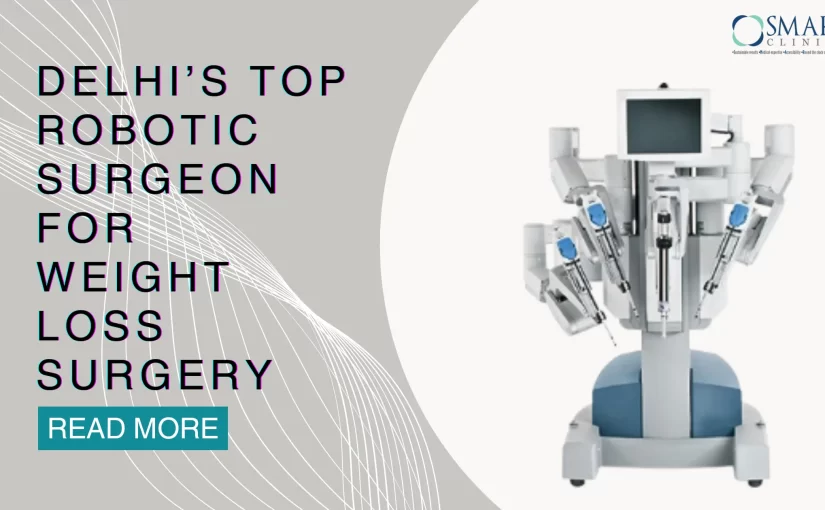In the heart of India’s bustling capital, Delhi, a revolution in weight loss surgery is underway. Robotic surgery, once a futuristic concept, has become a reality, offering patients a more precise and minimally invasive approach to achieving their weight loss goals.
When envisioning surgical options, the traditional image of a large incision and handheld instruments might come to mind. However, in recent decades, the field has dramatically evolved with the advent of minimal access surgery. This innovative approach, which requires only a few tiny incisions, has largely supplanted the more invasive open procedures. Among these advancements are laparoscopic surgeries, which utilize a telescope and specialized instruments, and, more recently, the sophisticated world of robotic-assisted surgery.
Robotic surgery, often referred to as robot-assisted surgery, merges cutting-edge robotic precision with the skilled touch of human surgeons, resulting in markedly improved patient outcomes. This advanced technique, which has been gaining momentum since its inception around 20 years ago, has seen an exponential rise in adoption among surgeons and hospitals alike.
The origins of robotic surgery trace back to the 1980s when the pioneering PUMA 560 robotic system made its debut in neurosurgical biopsies. However, it was the introduction of the Da Vinci Surgical System by Intuitive Surgical that truly revolutionized minimally invasive surgery. This state-of-the-art robotic platform offers unparalleled dexterity, precision, and 3D visualization, transforming the landscape of surgical procedures.
Today, virtually all surgeries that were once performed via laparoscopy can now be executed with even greater accuracy through robotic assistance. As the popularity of robotic surgery continues to soar, it’s crucial to choose the best robotic surgeon in Delhi for your weight loss journey.
Why consider robotic surgery for weight loss?
Robotic surgery systems consist of a console where the surgeon sits, a robotic arm system equipped with surgical instruments, and a high-definition 3D camera. The surgeon controls the robotic arms using hand and foot controls at the console, translating their movements into precise actions by the robotic system. The advanced technologies allow surgeons to perform intricate procedures with greater control and accuracy.
Advantages of Robotic Bariatric Surgery for Weight Loss
Robotic weight loss surgery, also known as robotic bariatric surgery, offers several advantages over traditional open surgery. These include:
Smaller incisions
Robotic surgery often requires smaller incisions, leading to reduced pain, minimal scarring, and a quicker recovery. This advanced surgical approach enables surgeons to carry out complex procedures with precision, allowing you to return to your daily activities sooner compared to traditional major surgery.
Enhanced precision
The robotic surgical system enhances precision and control during procedures, significantly minimizing the risk of complications and improving overall surgical outcomes. By offering detailed, high-definition visualization and allowing for finely tuned, dexterous movements, the robotic technology enables surgeons to perform complex maneuvers with greater accuracy. This heightened precision reduces the likelihood of inadvertent damage to surrounding tissues and structures, leading to fewer postoperative issues and a higher success rate.
3-D Visualization
The remarkable advantages of robotic surgery stem from its cutting-edge 3D visualization and the versatile movement of its robotic arms. These arms can rotate a full 360 degrees, offering a magnified, three-dimensional view of the surgical area. This enhanced perspective allows for meticulous tissue dissection and precise control over bleeding. The robotic arms can maneuver into tricky spots that might be challenging for a surgeon’s hands to reach, all while eliminating the usual hand tremors. This clarity and precision mean fewer complications and a faster recovery for patients. Thanks to the high-definition 3D camera, surgeons get a detailed, enlarged view of the surgical site, making it easier to make well-informed decisions throughout the procedure.
Shorter hospital stays
Patients who undergo robotic weight loss surgery usually experience a shorter hospital stay than those who have open surgery. The minimally invasive approach of robotic surgery leads to minimal tissue damage, reduced post-operative pain, and a faster recovery, allowing patients to return home sooner.
Faster recovery post-discharge
Robotic surgery offers patients the distinct advantage of shorter hospital stays, and faster recovery times compared to traditional open surgeries. This innovative approach is particularly well-suited for procedures involving pelvic organs, such as the rectum, uterus, prostate, and kidneys, as well as complex abdominal hernias.
Future of Robotic Surgery for Weight Loss
The future of robotic surgery is brimming with potential, with advancements in miniaturization, increased autonomy, and expanded applications across various medical specialties on the horizon. As technology continues to evolve, the integration of robotics into surgical practices holds immense promise for improving patient outcomes and advancing the field of medicine.
In simpler terms, robotic surgery is akin to having a highly-skilled, super-precise assistant working alongside your surgeon. This collaborative approach can result in less invasive procedures and potentially faster recoveries. It is a synergistic confluence of human expertise and cutting-edge technology, meticulously engineered to optimize patient outcomes and elevate the standard of care.
Qualities of a top robotic bariatric surgeon
Selecting the right Robotic bariatric surgeon involves a thoughtful and thorough evaluation. Here’s a refined approach to ensure you make the best choice:
- Experience and Qualifications: Seek a surgeon with extensive experience and advanced training in bariatric procedures and robotic surgery. Their credentials should reflect a high level of specialization and expertise in the field.
- Success Rates and Procedure Range: Examine the surgeon’s success rates and the variety of bariatric surgeries they offer. This insight will help you gauge their proficiency and the suitability of their techniques for your specific needs.
- Accredited Facilities: Choose a surgeon affiliated with highly reputable surgical societies and accredited hospitals or surgical centers. This affiliation indicates adherence to stringent quality standards and a commitment to excellent patient care.
- Comprehensive Care Services: Opt for a center that provides a complete spectrum of care, including thorough pre-operative assessments, expert surgical intervention, tailored nutritional guidance, and comprehensive post-operative support.
- Multidisciplinary Team: Ensure the center employs a dedicated team of specialists, including a bariatric surgeon and well-trained surgical team, bariatric nurse practitioner, bariatric dietitians, and program coordinators. A cohesive team approach is vital for achieving optimal results and delivering thorough patient support.
- Success Stories and Testimonials: Confirm that both the center and the surgeon have relevant accreditations and a proven history of successful outcomes in metabolic surgery. Review patient feedback and success rates to assess their effectiveness and patient satisfaction.
By carefully evaluating these criteria, you’ll be well-positioned to choose a surgeon and center that aligns with your goals for a successful and supportive bariatric surgery experience.
The journey to weight loss success
The journey to weight loss success begins with a consultation with a qualified robotic bariatric surgeon. During the consultation, the surgeon will assess your overall health, weight loss goals, and suitability for robotic surgery. They will also discuss the procedure, potential risks, benefits, and recovery process.
Pre-surgery consultations and preparations
Before the surgery, as per your health condition, you might undergo various tests and assessments to ensure your overall health and suitability for the procedure. These may include blood tests, a physical examination, and potentially a psychological evaluation.
Post-surgery care and lifestyle changes
After the surgery, you will need to follow a strict post-operative care plan to ensure proper healing and recovery. This may involve dietary modifications, medication, and regular follow-up appointments with your surgeon.
It’s important to note that weight loss surgery is just the first step in achieving your weight loss goals. Long-term success hinges upon ongoing lifestyle changes, including a healthy diet, regular exercise, and behavior modification.
Conclusion
The robotic surgical system has been successfully employed in hundreds of thousands of procedures worldwide. Robotic bariatric surgery, as an advanced, minimally invasive technique, provides several advantages over traditional laparoscopic bariatric surgery. These benefits include a lower risk of complications such as gastrointestinal leaks and wound infections, a shorter hospital stay, and a decreased likelihood of requiring follow-up surgeries or converting to traditional open surgery.
Choosing the best robotic surgeon in Delhi for weight loss surgery can significantly impact your journey to a healthier, happier life.
By considering the factors outlined in this blog, you can make an informed decision and partner with a skilled surgeon who can guide you toward your weight loss goals.
Schedule a consultation today with the best robotic bariatric surgeon in Delhi and take the first step toward a healthier, more fulfilling future.
Reference Links









